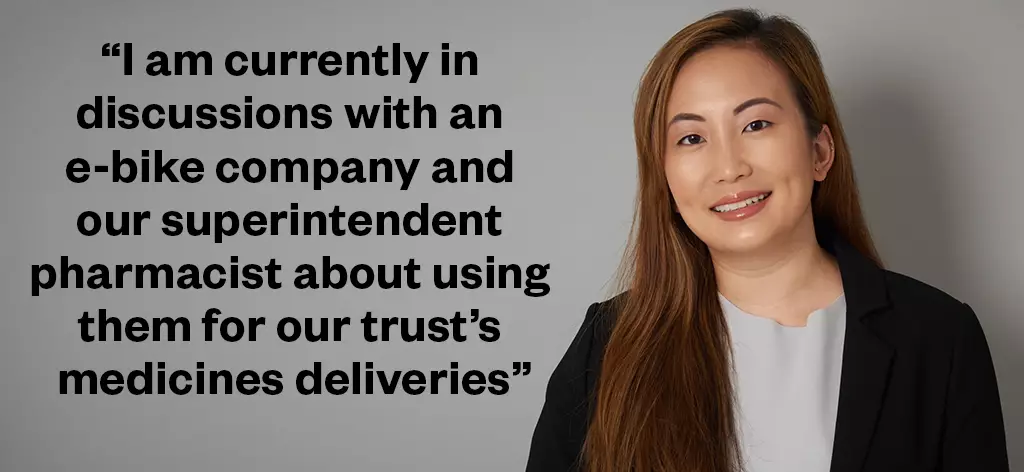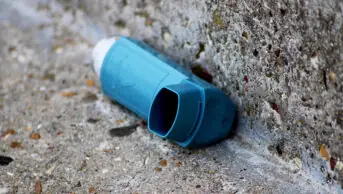
Mclean
Climate change is the defining issue of the 21st century and healthcare professionals should be leading on an issue that affects the most basic health requirements, such as clean air, safe water, sufficient food and adequate shelter[1].
In October 2020, NHS England published ‘Delivering a ‘Net Zero’ National Health Service’, which pledged to reduce the wider NHS carbon footprint, of which medicines account for a quarter of emissions, to net zero by 2045[2]. Of course, wherever medicines are involved, pharmacy should be taking the lead.
In March 2021, I met online with six other environmentally conscious pharmacy professionals from across the UK to discuss climate action and awareness. This resulted in the formation of the lobby group ‘Pharmacy Declares’, founded by Tracy Lyons, whose recent article for The Pharmaceutical Journal urged the sector to declare a climate emergency[3].
However, change begins at home. And so, after completing the NHS Leadership Academy ‘School for Change Agent’ course, I decided to use the energy and knowledge I had gained to start creating changes in my own NHS trust.
Here is a summary of what I have done so far, and although there is much more to do, I hope it inspires you to also push for change wherever you work:
1. Become ruthless with waste
I am lucky to be in a clinical team that is not afraid to push for change on my ward. We have put up signage to prevent plastic and recyclable waste being inappropriately discarded in our ward bins. We have also had meetings with senior staff in the pharmacy department to talk through ways of eliminating plastic bags in all dispensaries and reduce, or completely eliminate, the need for printing prescriptions utilising our advanced electronic prescribing system. These discussions are still ongoing owing to the complexity of logistics in this area, but we are confident a solution can be found.
There are plenty of resources that have been published about waste reduction and management available for those who would like to educate themselves
Since the start of the COVID-19 pandemic, the amount of disposable PPE usage has dramatically increased, contributing to pollution via inappropriate disposal. Various healthcare organisations have made the switch to reusable PPE, of course with careful consideration of the validity of the product and monitoring of effective laundering. Following a meeting with Roz Davies, business manager at Royal Cornwall Hospitals NHS Trust, who introduced a recycling machine for single-use PPE in her trust, I have contacted my infection control team to propose a roll out in non-clinical areas.
The process for this involves a multitude of top-level meetings, so I was pleased when I received a response. The trust did not take on board the idea for rolling out reusable PPE, but has instead changed the policy where staff in all clinical areas and non-direct care no longer need to wear disposable single use PPE if they are more than two metres away from patients.
I have also reached out to our supplies team to stop giving out free plastic water bottles to staff, suggesting refillable water bottles or water in aluminium cans instead, which are more easily recycled than plastic. There are plenty of resources that have been published about waste reduction and management available for those who would like to educate themselves. A good book I recommend to start with is Is it Really Green? by Georgina Wilson-Powell[4].
2. Educate and inspire
I have managed to secure a column in the monthly pharmacy departmental e-newsletter to include climate facts and pharmacy sustainability news, hoping to inspire all my colleagues to act when it fits with their priorities and values. This has generated some interesting discussions between pharmacy colleagues, where they have been sharing ideas of what they are doing individually to reduce their carbon footprint.
I am also occasionally invited to deliver teaching sessions to pharmacy, medical and nursing staff, and I have started to include a section on climate change and health in every presentation to make them aware of what they can do to improve the situation. I have had lots of positive feedback — one of the endocrine medical registrars described it as “insightful and eye-opening”. I also delivered the presentation to the North East Senior Pharmacists’ meeting, an occasional meeting of chief pharmacists and other senior pharmacists in the region, and various chief pharmacists described it as “excellent and thought-provoking”, resulting in a proposal to set up a regional pharmacy sustainability working group.
Make sure you are taking opportunities wherever you can to speak on these issues to a wider audience than those in your immediate teams.
3. Explore greener medication deliveries
One of the major ways that pharmacy contributes to greenhouse gas emissions is through our medicine deliveries, which have become even more important to reduce footfall in hospitals during the pandemic. I am currently in discussions with an e-bike company and our superintendent pharmacist about using them for our trust’s medicines deliveries. However, this collaboration will happen only if the company can meet our trust’s strict key performance indicators, so the contract discussion is still ongoing.
Our neighbouring trust — the Newcastle Hospitals NHS Foundation Trust — has been using electric cargo bikes to deliver medications since 2019 and its projected carbon savings after the switch is 828kg CO2 per annum, with an estimated annual cost saving of £25,000[5].
4. Look outside pharmacy for how to influence change
Pharmacists are respected healthcare professionals, and can use their scientific and clinical skills to communicate evidence on climate science and sustainability outside of the health service. I communicate widely through being active on social media, sharing information and encouraging others to engage with a conversation about the NHS ‘net zero’ change and how the health service can be more sustainable.
One of my posts recently caught the attention of a Maths4Girls educator who invited me to speak on a panel in a future career’s event advertised for secondary school girls on how pharmacists can reduce the environmental impact of medicines to save the world.

5. Collect data
Inhalers are one of the most significant contributors to NHS greenhouse gas emissions, contributing 3% of total emissions at ‘point of use’ [2]. The Regional Drug & Therapeutics Centre (RDTC) in Newcastle has worked closely with various pharmaceutical companies and developed an inhaler carbon calculator tool commissioned by various clinical commissioning groups to calculate projected carbon savings and cost implications. With permission, I have sent my trust’s inhaler use data to RDTC to be analysed, as it is seeking to collect more secondary care data to measure as a starting point for carbon reduction as per the ‘NHS long-term plan’.
I plan to also reach out to the anaesthetic team to start collating data on anaesthetic gases use in our trust, which are also a major contributor to NHS greenhouse gas emissions. Data collection and monitoring should be made easier when the ‘greener NHS’ metrics have been fully developed and shared to all healthcare organisations in the near future.
6. Befriend your sustainability officer(s)
To create change, you need to get to know the person that is going to help you achieve it. The ‘2021/2022 NHS standard contract’ sets out a requirement for trusts to develop a ‘Green plan’ to detail their approaches to reduce their emissions in line with the national trajectories[6]. I was keen to introduce myself to the director of estates in my trust, who happens to be the lead sustainability officer writing our trust’s ‘Green plan’. I was ecstatic to find out a series of suggestions I have made such as getting rid of plastic cutleries and cups, better signage for bins and installing more electric vehicle charging points, are already in included in the proposed ‘Green plan’ to be rolled out chronologically the coming months.
This is a work in progress, and I have accepted that I might not receive a reply or a satisfied response to some of my proposals. But, as healthcare professionals, we have a moral duty to keep raising awareness for the sake of global health and what is looming around the corner. I will keep the conversations flowing in my trust until it reaches the ears of those who can enact the change this planet desperately needs.
Green pharmacy: a call for papers
The editors at The Pharmaceutical Journal invite ideas for articles, blogs or research papers from all sectors of pharmacy and the pharmaceutical industry that relate to the climate emergency or the sustainability of pharmacy. Click here to find out more.
- 1Climate change and health. World Health Organization. 2018.https://www.who.int/news-room/fact-sheets/detail/climate-change-and-health (accessed Aug 2021).
- 2Delivering a ‘Net Zero’ National Health Service. NHS England. 2020.https://www.england.nhs.uk/greenernhs/wp-content/uploads/sites/51/2020/10/delivering-a-net-zero-national-health-service.pdf (accessed Aug 2021).
- 3Pharmacy must declare a climate emergency. Pharmaceutical Journal Published Online First: 2021. doi:10.1211/pj.2021.1.82489
- 4Wilson-Powell G. Is It Really Green?: Everyday Eco Dilemmas Answered. Dorling Kindersley 2021.
- 5Zooming into a greener future: The case for a zero-emissions courier services. NHS England. https://www.england.nhs.uk/greenernhs/whats-already-happening/zooming-into-a-greener-future-the-case-for-a-zero-emissions-courier-services/ (accessed Aug 2021).
- 62021/22 NHS Standard Contract. NHS England. 2021.https://www.england.nhs.uk/nhs-standard-contract/21-22/ (accessed Aug 2021).


